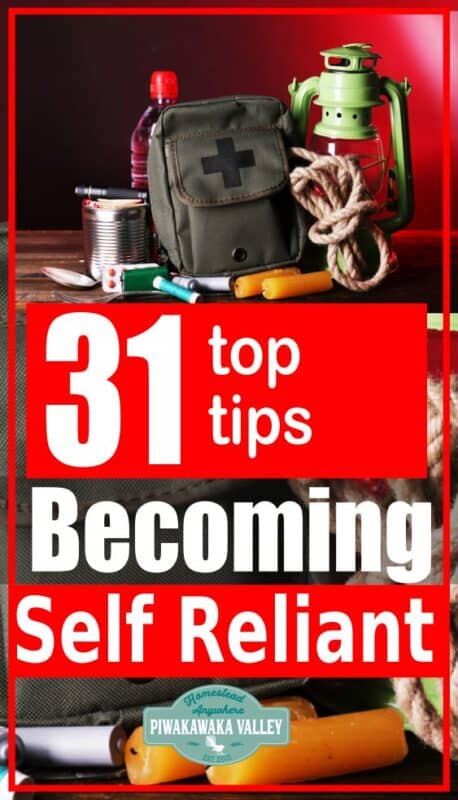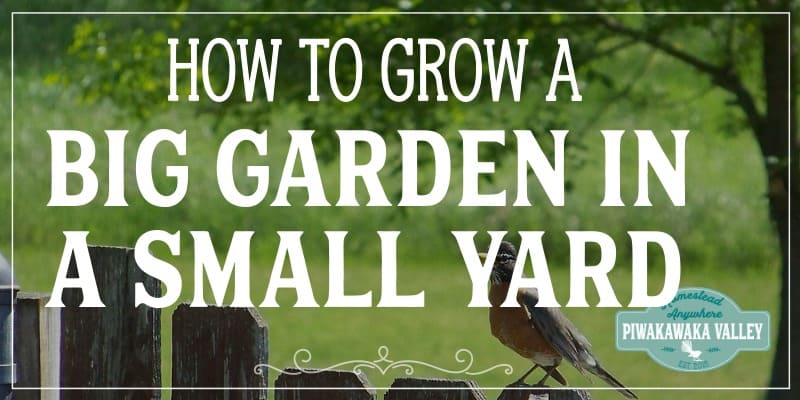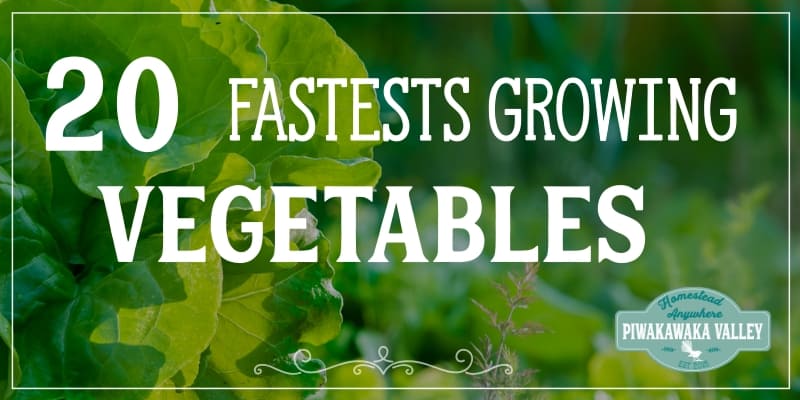This post was most recently updated on April 12th, 2023
is the art of being prepared for anything and being able to life a fairly , without depending on what is happening in the rest of civilization.
Please read: This information is provided for educational purposes only and is not intended to treat, diagnose or prevent any disease. We encourage you to make your own health care decisions in partnership with a qualified health care professional.
This post contains affiliate links, this means at no extra cost to you, we make a commission from sales. Please read
our Disclosure Statement
These practical survival tips are designed to help you start carefully planning your own self reliant life plan. Remember, your individual plan will be different to the next person’s and it is best to remember that comparing yourself to others will do you no favors.
Your life can change in under a year, ordinary folks can have a truly extraordinary impact, while living a life that feels aligned to you. AND you can get it to pay for itself so you don’t need to wait 10 years of working a day job to get there.
31
Your plan will be unique to you, your land, climate, social and family situation and your known skills. If you have a backyard urban homestead, a rural or something in between, there is always something we can work on and improve.
There are key parts to survival, but even if you aren’t doing this for a SHTF situation, there are important parts of life that you can take increasing responsibility for and control over. These are:
- Water
- Shelter
- Warmth
And if you want to be a useful member in a community these things are also helpful to build and maintain
- Medicine/herbal remedies
- Family and friends
- Bartering
- Skills like mechanics, sowing, building
Pick and choose from the tips below to put together a plan that will work for you and your situation. If you don’t have a yard to grow a garden, maybe preserving cheap produce is a better place for you to start. Don’t try and do them all at once, start with one or two, master them and then build from there.
1. Start with a garden
I am a firm believer that starts with two things – a garden and some chickens. The internet is full of amazing tips, but in a down situation, what you really need is a good, zone specific, book .
Growing your own , even if it is just a little bit, might be the difference between starving and surviving in a shortage crisis. This essential step can be started, even if you are starting your journey while living in an apartment .
Containers of herbs and grown on a patio will teach you so much about growing and caring for plants, so much more than reading about it in a book will.
is one of our , and without it we do not survive long. You can easily improve your by growing at least some of your own . If you can keep chickens you can throw them your food scraps and they will turn them into eggs for you!
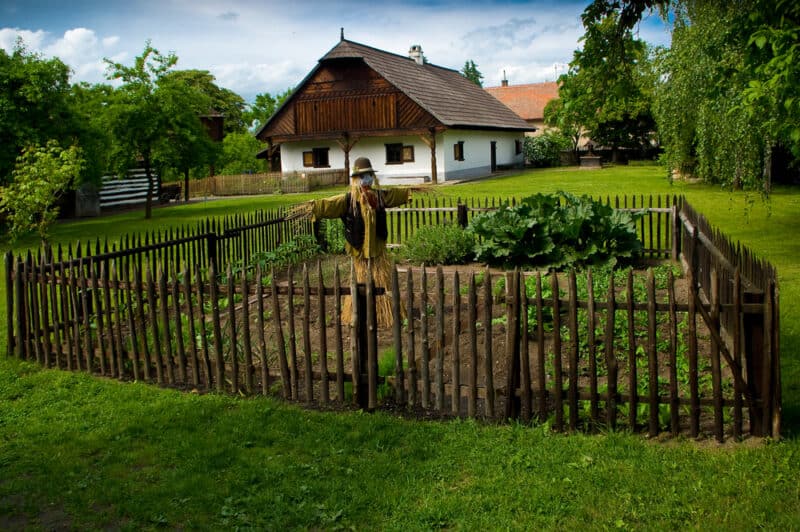

RELATED: How to harden off seedlings so the don’t die
2. Always sow seeds early and grow extra
Starting plants from seed costs much less than buying transplants from the store does, and it allows you to grow from seed that you have saved yourself.
Open pollinated and heirloom varieties will grow ‘true to type’ if you save their seeds, whereas hybrid (F1) types will not, so you will have to keep buying the plants or hybrid seeds fresh each time.
Inevitably something will happen to the seedlings – some will fail to germinate, some will fail to thrive and some I will fail to remember to water – so always plant a lot more than you think you will need.
Seeds are cheap (free if you save them yourself!), and having extra at the end of planting out your garden will give you some spares to share around, gift, or barter with.
Or alternately you can pop them in the edge of your flower garden to grow .
RELATED: How to harden off seedlings so the don’t die
3. Learn to grow organically
using vast numbers of bought chemical fertilizers and pest controls are both expensive and unnecessary. Look for books, or very old books for information on feeding your plants, looking after the soil , making compost and dealing with pests.
Organic and fruit from the store are now sprayed with up to 70 different “approved” chemicals, that they are no longer truly organic. Growing your own and fruit will ensure that you and your family are avoiding all the toxic chemicals on so many foods.
An organic garden will develop a natural web of predators and prey species, sometimes all it needs is time to find its natural balance.
4. Build season extension
Whether you believe the current climate change, the-world-is-getting-warmer narrative, or if you subscribe to the we-are-heading-for-another-ice-age way of thinking, season extension will still give you more harvest and leave you better prepared.
A hoop structure can be covered in plastic to create a longer, warmer season, or it can have the sides rolled up, and shade cloth applied to cool down a hot sun.
A walipini built in to the soil will have a much more constant temperature, and can be used to harvest the heat of the sun and to store it in the thermal mass of the soil below.
A simple cold frame or seed raising house will allow you to start you seeds well before the last frost.
5. Learn to save seeds
Saving your own seeds is key to ensuring that you will have not only this season, but for the coming years as well. A truly is not going to be relying on Monsanto to provide your GMO soybean seeds every year.
Some plants are super easy to save seeds from – peas and beans you just leave a few pods on the vine until they are totally dry.
Carrots and parsnip will send up flower shoots in their second season if you leave them in the ground, as will lettuce and cabbage.
Plants like squash, zucchini or pumpkin will cross pollinate easily, so care has to be take if you are growing more than one of these in an area.
6. Grow medicinal herbs
Even if you don’t really know how to use the herbs yet, there are some that are worth getting established anyway.
Personally, I would start with
- Oregano – a potent anti bacterial
- Garlic – anti bacterial, anti viral, anti fungal
- Peppermint – keeps away bugs
- Bay – can be placed in dried goods to keep away weevils
- Fennel – aids digestion
- Valerian – relaxant
- Opium poppy or Californian poppy – can be turned in to pain relief
- Comfrey – also known as knitbone – speeds up healing
- Feverfew – reduces fever and stops migraines
- Willow – anti inflammatory – it is what aspirin was based on
- Yarrow – stops bleeding
RELATED: Top 10 medicinal herbs and their uses
7. Grow useful trees
Along with starting a garden, adding useful trees to your backyard is a great way of increasing your as they grow.
Obviously you can grow , but nut trees can provide high protein, high fat nuts which can be used for flours and oils.
Firewood will be necessary to keep your wood stove burning – aim for a mix of fast growing, quick drying and cooler burning woods like pine, or willow and some slower growing, slower dying, hotter burning woods like oak, eucalyptus or ash. Here are the best firewood options and how to dry them fast!
Here are some good wood ideas to include in your woodlot
- Weaving – willow or hazel
- Medicine – willow or pine
- Fence posts – black locust or cedar
- Animal fodder – poplar, willow, tagasaste,
- Building or carving – oak, ash, pine, cedar,
8. Learn to preserve
There is no point learning to grow your own and wanting to live a if you have no idea how to preserve your own .
Buy a pressure canner so that you can preserve low acid foods ( and veggies) in jars without needing a fridge or freezer (find out how to use one here).
is not limited to pressure canning however. Learn to ferment foods , store them without a fridge, or even how to dry so it doesn’t need to be kept cold.
There are so many delicious recipes for preserving fruit and . However, pickles, chutney and jam will quickly fill up your storage space if you don’t also routinely cook with them and eat them, so either change up the way you are eating to match what you are preserving, or only preserve what you know you will eat or gift to someone else.
9. Build a root cellar
I would argue that no homestead is complete without a cold store of some description. Usually these days it consists of an old-school root cellar, but I have heard of people even re-building an old ice house on a property in the UK.
A root cellar is exactly that, a place dug in to the ground that remains cool and humid, perfect for storage , especially your root crops and some other fruits and without needing to be canned or refrigerated.
An ice house is equally well insulated, usually built of very thick stone walls, buried in the earth. When the snow comes, it is gathered up and placed in the ice house. As it compacts down it forms a thick layer of ice that will last many months after the snow outside has melted. Embrace your inner pioneer and maybe an ice house is an option for your homestead.
10. Get off
The great Agenda 2030 wants people off of the land, and in to “smart cities”. This will mean, that under some ruling or other, they will start limiting services to the rural areas – be it climate change, or money saving , a cyber attack or some other disaster. Basically, if you want to be self reliant, and survive out in the rural areas, you should be aiming to go totally off .
Even if you cannot afford the whole system up front, some panels and a battery will give you more than zero if the goes down. Wind or hydro are both other options that you might like to look in to as well.
We have a 20 kW system and a 25kWh battery and a 5kW inverter. If the went down, we can survive off what we have with some careful management, but the extra battery capacity would be helpful.
11. Have a water source and pump
Water is the source of life. Without it you have no hope of living for very long. You can add a simple rain barrel to one of your down pipes to at least have some water of your own.
Here in New Zealand we use rain water off our roof in most rural areas as our main water source. A few people have in ground wells, but most of us use rain water unless they are in the cities or towns where there is a town water supply.
The only with your own water, is that you need a way to get it out if the goes down. A solar, gas or hand pump is a great idea to keep on hand.
12. Have a wood stove
I straight up love our wood stove. We use it to heat the house, heat the hot water, run radiators (central heating) and I can both cook on top and in the oven of it.
A wood stove will keep you warm and fed even when the power is out as long as you have enough firewood. I have successfully used the pressure canner on our wood stove with good success as well.
13. Use old tools
Old tools didn’t rely on gas/petrol or electricity. Many of them are man powered and are less complex to fix, use or maintain. Hunt around estate sales, farm sales and second hand stores for old gadgets – hand egg beaters, hand powered drills, flour mills, grain crushers, sharp chisels and more.
Spend some time getting to know your tools as you sharpen and grease them and get them working.
14. Get useful books
There is no point having all the information stored on your computer if the , or even just the internet goes down. Have a good stash of quality books.
Recipes, , medicine, herbs, how-tos, old law dictionaries, and animal husbandry are all areas to look at getting a good bookshelf full of books about. Keep an eye out for bargains at estate sales and second hand book stores.
15. Build a community
No one should be an island. A self reliant, self sufficient person knows their community and knows who has what skills and has enough of a relationship with them to be able to ask them for help.
Don’t waste what time we are enjoying now – use this space to run and attend community workshops, networking and other community events. Take some baking to the neighbors and get their names and phone numbers and a general feel for their tools, skills and abilities. Be sure to also offer yours in return!
If you have large outdoor projects that need man hours – look at running a workshop at the same time – we did this with planting out our forest . I had a 3 week old baby at the time that our fruit trees were ready to be planted.
So through a local community hub we advertised a hands on workshop – I gave a half hour presentation on forest planning and then I showed them when and how to plant and mulch our trees and they got stuck in.
We got about 80 trees, over 100 smaller plants and a 1/4 acre mulched in one day with some willing and happy volunteers.
16. Protect your health
Your health is of utmost importance. Without it you will struggle. A fit, healthy body will withstand a lot more onslaught and can take on more than an overweight (or underweight) sickly body can.
Eat well, avoid the standard Western diet of sugar, grains and seed oils. Eat plenty of and animal products, cook with animal fats and add as you see fit.
Stay fit
Exercise regularly and lift heavy things. Avoid running unless necessary as it is a stress on the body. Walk or swim, get strong. and cleaning out animal sheds are a good way to get productive exercise.
Learn herbal medicine
A reduction on the modern medicine can only be a good . Learn how to make your medicines at home with some good quality books and courses on herbal preparations. Personally, I really value the learning that I have gotten from the Herbal Academy .
Learn first aid
Basic first aid saves lives. Once you have this down you can learn more advanced techniques like stitching and minor surgery for emergency situations.
17. Build defenses
If you are well stocked and have plenty of supplies, the best you can do for you and your family is to hide them well.
Ideally you will have spent some time thinking about ways to protect your family – be that guard dogs, solid core doors, firearms or hand to hand combat. Whichever you choose to implement, be sure you know how to use them well.
Negotiation tactics, confidence and the ability to talk yourself out of a situation is one of the very best skills you can develop, it will save your life and your conscience more than knowing any combat ever will.
18. Learn sharpen a knife
A sharp knife is a safe and effective knife. Learn how to sharpen and keep your knives sharp. Buying a whet stone is probably one of the best investments for the longevity of your knives. Also, invest in a few good quality knives, I would recommend at least:
19. Learn to light a fire
Get yourself a flint and steel and work out how to use it. Then you will never need matches or a fire lighter again.
20. Create a bug out
Having a second place that you can go to incase of unrest is a really sensible plan. Stock it with plenty of , seeds for , a water supply, medication and solar power. Basically a home away from home. You can make it an underground bunker, a cabin in the woods, an RV or anything in between.
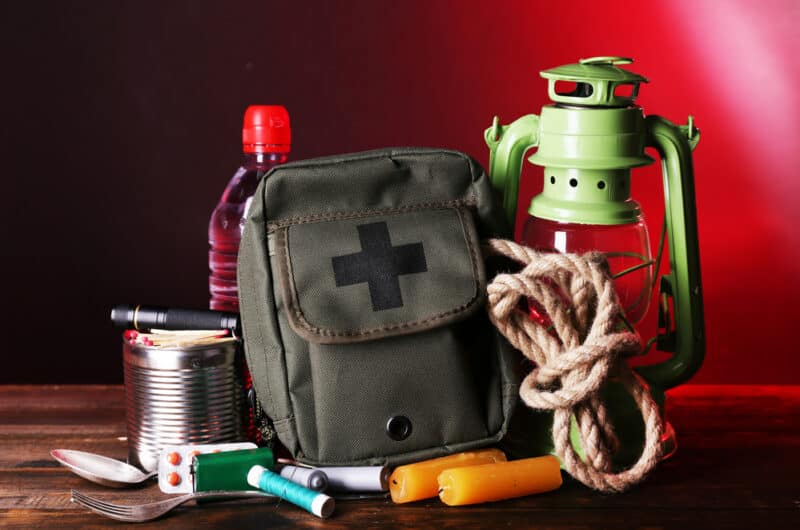

21. Store barterable items
In a down scenario, guess what else goes down – our banking. Get yourself a store of random pure silver items – cutlery, coins, and random gold and silver jewelry. These can be used in place of currency as required.
Some cash, plants, seeds, medications and other items also make great things to barter.
22. Have stored staples and buy in bulk
Storing away staple foods won’t help you forever, but they will buy you time to get your garden functioning better and establish new supply chains.
When the lockdowns and panic buying started in 2020, we found that while the supermarket never had flour or sugar on their shelves, if you could afford to put in a bulk order, the catering supply companies were able to sell us larger bags for less per KG than what we were paying at the supermarket anyway.
23. Get a horse and cart
I am joking. Sort of. Actually a horse might be something that might work for where you are, but real draft horses that are trained to pull carts or tilling machinery are hard to find these days.
However, if you are off , you might be able to increase your energy producing capacity and get a modern day horse – an electric vehicle.
An EV gives you the ability to travel, at least limited distances, without needing to fill up at gas stations, giving you a method of transport that isn’t relying on any kind of supply system.
24. Learn to safely forage wild edibles
Nature is abundant, and there is plenty available to eat when you know where to look . Mushrooms, herbs, leafy greens, even some bark and roots can make a nourishing survival meal without costing you a cent.
is not the only option for getting to eat.
25. Learn old building practices
Old buildings were not held together with nails and screws, they were carefully cut to lock together and used dowels instead of nails.
If you can build a table, a chair and a shelter without needing power, you will be well prepared for whatever happens.
Earthbag buildings are another accessible technique.
26. Build an in-ground kiln
My girls love to go out and dig clay and make their own pottery. Next on our list is to build a fire pit to use it as both a cooking place as well as a kiln for drying our own pottery. I found this video useful.
27. Learn to hunt
If you have a firearm and know how to hunt with it, you will have access to wild game. Learning to fish goes along with this as well. Being able to field dress game, and skin, gut and fillet a fish are both great life skills to pass on to the next generation.
These both take practice and some essential tools, so get these now and get practicing!
28. Raise your own or eggs
Even if you live in the city, you can grow your own rabbits , quail or chickens to raise your own or eggs.
Green living and encourages a small foot print – nothing is much smaller than just using your own backyard!
Chickens, rabbits or quail will turn extra veggies and grass into and eggs quickly and with ease.
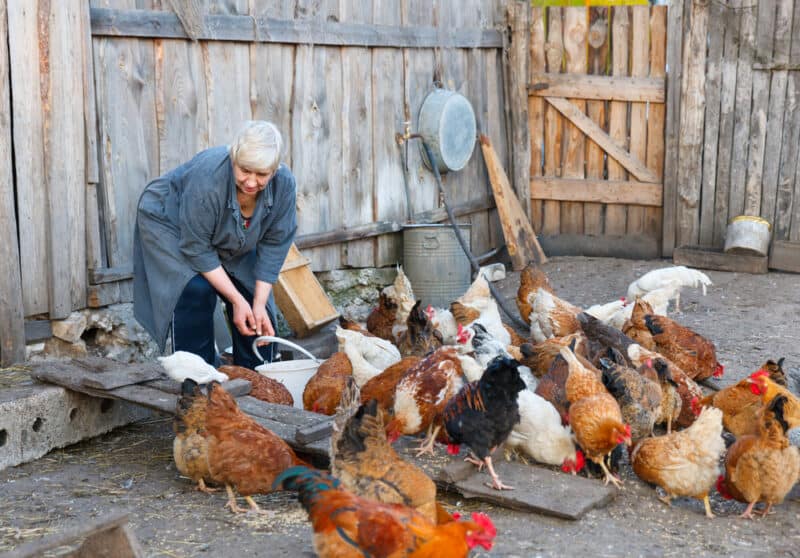

29. Make your own cleaners and soap
Making your own soap is easy if you have some commercially produced lye, or you can give it a go extracting your own from wood ash.
You can use tallow, lard or vegetable oils to make soap. And home made apple cider vinegar works well to clean most things.
30. Get some conveniences
Not everything in the self reliant, prepper space is hard, going-without and boring. There are some very handy gadgets that you can use to make your life easier.
Solar powered cell phone battery
This will help keep your phone working, even when the power isn’t. Grab one here.
Wind up torch
With the power of your hand (or your kids hand) you have have endless light. These wind up LED torches are what I got our kids for camping and they love them.
Walkie talkies
We got our kids a set of 4 walkie talkies that have a massive range on them. This is really helpful when they adventure off down in the paddock without a grown up and we have easily contact them if we need to.
Battery radio
It is an old timey – almost extinct – piece of technology, but in an emergency situation, it is helpful to know what is going on around you and this is one that I have just ordered!
31. Teach your children
This is probably my biggest piece of advice. Our children need to learn how to stand on their own two feet, how to be independent of the system and how to think for themselves. Critical thinking is no longer taught in schools, they are taught how to regurgitate the information they are fed verbatim in an exam, but not how to look deep and critically analyze the content or motive behind it.
Children are not taught that our fiat money system creates money out of thin air every time a loan is created. That our taxes do not pay for services, they are there to service national debt instead. We are not teaching them the power of compound interest, in both debt and in wealth. We are raising a generation of financially illiterate humans, and the generations before them are profiting from their naivety.
Children are taught to eat commercially produced, sugar, soy and seed oil laden “health foods” while natural foods like and butter are demonized because really they aren’t as profitable for anyone lobbying the government.
No one is taught how to grow an organic garden, to raise backyard chickens or meat rabbits.
We own it to ourselves and all future generations to pass on our resilience and , as well as an appreciation for a strong family and community to our next generation. The best way to do it is to get passionate about it yourself, your passion is contagious. Get to it.
